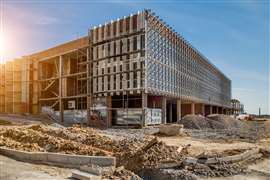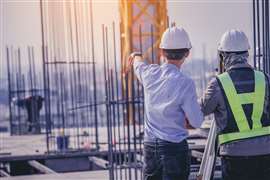Q&A: Does the construction industry understand the importance of data analysis?
19 September 2024
Construction Briefing speaks to Dr Sakthy Selvakumaran, a Chartered Civil Engineer, about the role of data in construction and whether the industry understands its importance.

Q: Does the construction industry understand the importance of data analysis, or has it been a hard sell?
A: People in construction are increasingly aware of the value of data, with the advent of things like digital twins, for example. The industry is at that point where we acknowledge there’s a problem: that if you can’t measure something, it’s difficult to understand it. So, people are open to improvement in many areas, from productivity to the ways in which the impact of climate change is assessed.
The hard sell, then, is how we can improve things. We’re now better at generating and storing data – but generating insights from a vast range of disparate data sources and making use of that data is something the sector still struggles with. So, the real challenge is bringing people along that journey, helping them make better use of new and existing datasets that are growing in size exponentially.
Q: BKwai describes itself as “making the complex simple”. How do you achieve this and what technology do you employ to do so?
A: There’s a real opportunity for making better use of data now. There’s a huge difference, for example, between relying on just six survey points for monitoring a project that are assessed every few weeks, to having access to thousands of datapoints from a variety of sources – some available in real time. The challenge is being able to pick out patterns and trends from these very different data sources and gain insights from the data or make forecasts and predictions – something that humans find difficult but which is easy for a machine.
This is where BKwai steps in. Machines can spot hidden insights within a tangled mass of data, no matter how many datasets are brought in. Our platform uses data from all kinds of sources, from satellites and in situ sensors to environmental datasets, using adaptable technologies that collect data in many different ways. Our solution then collates this data to analyse patterns within it, allowing companies to find the cause of what’s going on using our forensic analysis tools, as well as enabling them to predict what’s likely to happen. This facilitates preventative rather than reactive action, enabling our users to drastically reduce maintenance costs, lower risk and to eliminate a large proportion of the errors that can occur during the construction or redevelopment process.
Q: Do you have a typical client and what are some of the projects your company has worked on? How was BKwai’s technology utilised for the Thames Tideway tunnel project?
A: We typically work with Tier 1 contractors on major construction projects, some key examples being the new Everton Stadium and the Thames Tideway tunnel project. However, we also work with asset managers who are responsible for, amongst other things, national critical infrastructure such as highway and rail assets, too.
How our platform is used varies from project to project. However, it generally consists of collecting and analysing data to improve asset management and forecasting outcomes. When working on Thames Tideway, for example, our advanced technology played a pivotal role in mitigating flood risk during the construction of one of the sites on the 25km super sewer being built under the River Thames to bring London’s sewer system up to data and up to capacity, preventing waste from spilling into the river when it rained.
The project essentially called for a 41m-deep shaft to be excavated at Falconbrook Pumping Station, but the shaft and surrounding area were prone to flooding during heavy rain, posing significant risk to both workers and equipment that had to travel down there. Initially, the site team relied solely on weather forecasts to predict potential flooding, but this led to both frequent last-minute evacuations that put people and assets in danger, and unnecessary delays when work was postponed but no flooding occurred.
A network of sensors was therefore installed to monitor water levels in real-time. We integrated this data with weather data from over ten stations, with our data-science team using these inputs to develop predictive models that could forecast water levels days in advance, providing critical warnings before flooding occurred. The predictive analytics, accessible on the BKwai platform and displayed on-site, allowed the team to plan more effectively, reducing the need for rushed evacuations and keeping lost working days due to false alarms to a minimum.

This is the perfect example of how our smarter, data-driven approach can be tailored to each project and client to deliver uniquely beneficial outcomes.
Q: Is understanding data the key to a more sustainable construction industry?
A: Yes, definitely. One of the big challenges in construction is sustainability and climate change. And there are so many examples of how measuring things and understanding this data could make the sector more sustainable.
If we can measure change, access data and understand how things are behaving, we can move into forecasting problems rather than fixing them when things have gone wrong. In this sense, data saves time and material resources – something that’s ultimately good for the planet. We want to avoid rework or rebuilding. Rather, we want to prevent things from happening. And rather than knocking buildings down and constructing new ones, which is costly and creates a lot of material waste, companies can use data to understand how their existing structures behave, extending their lifespan and opting for eco-friendly retrofit options, rather than rebuilds.
Q: How will technology impact the construction industry over the next decade? Are there any trends we’re seeing now that will foreshadow this?
A: Construction is often regarded as a sector that’s slow to change. But we’re now at the point where tech can make a big impact over the next decade. At BKwai, for example, we’re making data more accessible, which is helping to overcome challenges such as systems that struggle to talk to and share data with one another. We’re using machine learning to get a better understanding of the enormous quantities of data that can overwhelm the engineer, surveyor or asset manager and if the industry as a whole can deal with those challenges, there’ll be huge growth in our sector.

About the author
Dr Sakthy Selvakumaran is the founder of the University of Cambridge and CSIC spinout company, BKwai, a data analytics platform for the construction sector, which aims to improve the resilience of built assets. The Thames Tideway Tunnel project in London, UK used BKwai’s sensor and weather data to predict flood risk as they built a super sewer recently.
STAY CONNECTED



Receive the information you need when you need it through our world-leading magazines, newsletters and daily briefings.
CONNECT WITH THE TEAM








